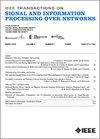Event-Triggered Distributed Estimation With Inter-Event Information Retrieval
IF 3
3区 计算机科学
Q2 ENGINEERING, ELECTRICAL & ELECTRONIC
IEEE Transactions on Signal and Information Processing over Networks
Pub Date : 2024-03-11
DOI:10.1109/TSIPN.2024.3375605
引用次数: 0
Abstract
Distributed estimation has attracted great attention in the last few decades. In the problem of distributed estimation, a set of nodes estimate some parameter from noisy measurements. To leverage joint effort, the nodes communicate with each other in the estimation process. The communications consume bandwidth and energy resources, and these resources are often limited in real-world applications. To cope with the resources constraints, the event-triggered mechanism is proposed and widely adopted. It only allows signals to be transmitted if they carry significant amount of information. Various criteria of determining whether the information is significant lead to different trigger rules. With these rules, the resources can be saved. However, in the meanwhile, some inter-event information, not that important but still of certain use, is unavailable to the neighbors. The absence of these inter-event information may affect the algorithm performance. Considering this, in this paper, we come up with an inter-event information retrieval scheme to recover certain untransmitted information, which is the first work doing so to the best of our knowledge. We design an approach for inter-event information retrieval, and formulate and solve an optimization problem which has a closed-form solution to acquire information. With more information at hand, the performance degeneration caused by the event-triggered mechanism can be alleviated. We derive sufficient conditions for convergence of the overall algorithm. We also demonstrate the advantages of the proposed scheme by simulation experiments.事件触发分布式估计与事件间信息检索
过去几十年来,分布式估算备受关注。在分布式估算问题中,一组节点根据噪声测量结果估算某些参数。为了充分利用共同努力,节点在估算过程中会相互通信。通信会消耗带宽和能源资源,而这些资源在实际应用中往往是有限的。为了应对资源限制,人们提出并广泛采用了事件触发机制。这种机制只允许传输携带大量信息的信号。确定信息量是否重要的标准各不相同,从而产生了不同的触发规则。通过这些规则,可以节省资源。然而,与此同时,一些并不重要但仍有一定用途的事件间信息却无法提供给邻居。这些事件间信息的缺失可能会影响算法性能。考虑到这一点,我们在本文中提出了一种事件间信息检索方案,以恢复某些未传输的信息,据我们所知,这是第一项这样做的工作。我们设计了一种事件间信息检索方法,并提出和解决了一个优化问题,该问题具有获取信息的闭式解。有了更多的信息,事件触发机制导致的性能下降问题就能得到缓解。我们推导出了整体算法收敛的充分条件。我们还通过仿真实验证明了所提方案的优势。
本文章由计算机程序翻译,如有差异,请以英文原文为准。
求助全文
约1分钟内获得全文
求助全文
来源期刊

IEEE Transactions on Signal and Information Processing over Networks
Computer Science-Computer Networks and Communications
CiteScore
5.80
自引率
12.50%
发文量
56
期刊介绍:
The IEEE Transactions on Signal and Information Processing over Networks publishes high-quality papers that extend the classical notions of processing of signals defined over vector spaces (e.g. time and space) to processing of signals and information (data) defined over networks, potentially dynamically varying. In signal processing over networks, the topology of the network may define structural relationships in the data, or may constrain processing of the data. Topics include distributed algorithms for filtering, detection, estimation, adaptation and learning, model selection, data fusion, and diffusion or evolution of information over such networks, and applications of distributed signal processing.
 求助内容:
求助内容: 应助结果提醒方式:
应助结果提醒方式:


